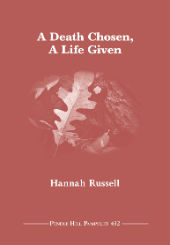A Death Chosen, A Life Given
Reviewed by Amy Whiffen
January 1, 2016
 By Hannah Russell. Pendle Hill Pamphlets (Number 432), 2015. 30 pages. $7/pamphlet.
By Hannah Russell. Pendle Hill Pamphlets (Number 432), 2015. 30 pages. $7/pamphlet.
Buy from Pendle Hill
A Death Chosen, A Life Given is a very personal story of Russell’s husband’s death and her grief. Russell gives an honest account of her struggle after her husband’s terminal cancer diagnosis led him to take his own life. The pamphlet takes us through various parts of their story and the many issues she wrestled with after his passing. She draws on religious teachings and spiritual leaders as she searches for meaning and solace from the grief.
Anyone who has had a loved one pass too soon can identify with Russell’s vulnerability and emotions. The reader can feel her pain through the pages. She genuinely battles with understanding her husband’s actions and reconciling her guilt. As she grapples with her grief, she looks to the Quaker tradition of “living into the question” for strength and guidance. I like that she leaves some of her questions unanswered, open for the reader to seek her own answer just as she has done.
As end-of-life care increasingly becomes the domain of medical institutions, Russell raises important concerns about how we can support our loved ones in dying with dignity, whatever that may mean for them. As a young adult, I’m fortunate to have had only a few experiences with death of loved ones, yet Russell’s vulnerable and emotional story struck me. I work in a hospital emergency room where people too often find themselves facing some of these difficult questions about death. Like Russell, I wonder, how can we make space to talk about dying? How do we respond to our fears and find clarity about how we can die with dignity before the moment comes? These questions aren’t answered in this pamphlet, yet her story highlights the importance of continuing to ask the questions and seek answers for ourselves.
In the case of her husband, Russell understands the importance of integrity and dignity in death, but she still searches for meaning. By putting herself in his shoes, Russell tries to experience and feel what her husband felt. I appreciated how, through the pain and loneliness, she searched for meaning from her community and religious beliefs, finding solace in the Bible and other religious teachings.
After many questions and with time, Russell’s clearness comes. She finds signs of her husband’s presence and says, “I feel we are one, that I have not lost him so much as gained his spirit, his strength, and his wisdom, that I am living life fully for both of us.”
I loved her discussion of the Divine plan and how it transforms violence into love and unity of all things. For me, in the end, her lessons of forgiveness and love shine brighter than the pain and grief of losing her husband. Her closing message stood out: “I have found my way, even stumbling and falling as I have often done, to a peaceful place on the other side.” I hope all those who stumble through grief and loss are able to find that peaceful place on the other side.



Comments on Friendsjournal.org may be used in the Forum of the print magazine and may be edited for length and clarity.